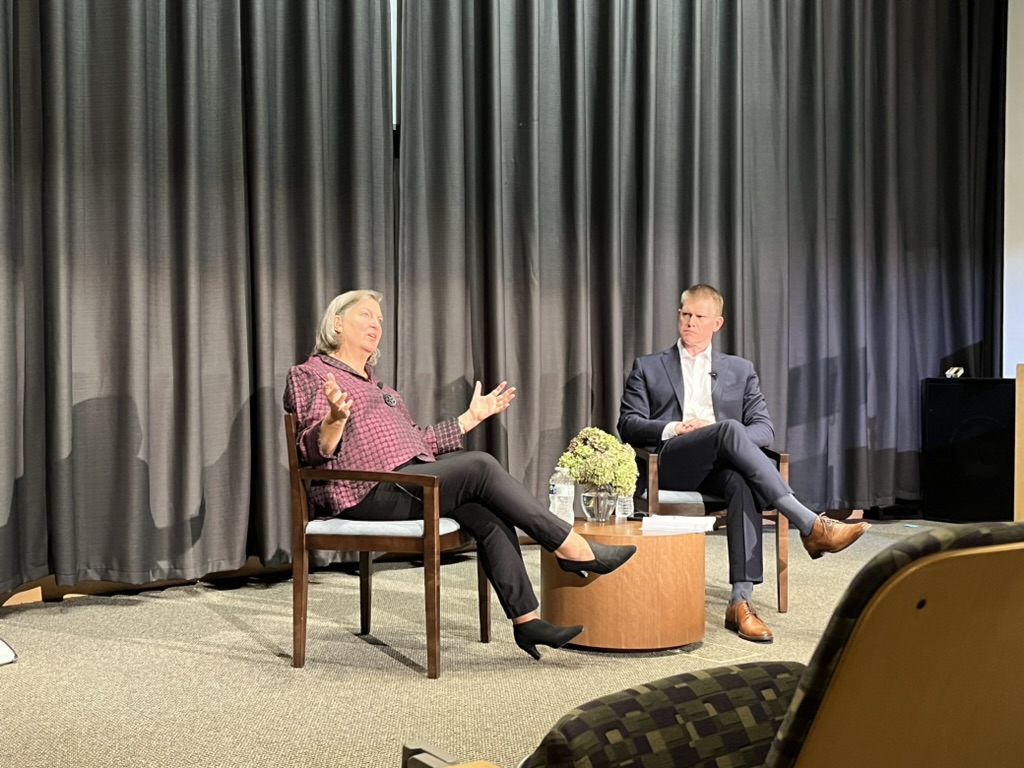“I Have Hope”: Ambassador Nuland hosted by Jackson School
Ambassador Victoria Nuland, former under secretary of state for political affairs under President Biden, discussed the future of U.S. leadership in the world.

Samantha Warfel, Contributing Photographer
On Wednesday, Ambassador Victoria Nuland, former acting deputy secretary of state under President Joe Biden and 35-year career diplomat, spoke at the Jackson School about the future of U.S. global leadership.
The talk was moderated by professor Michael Brenes, co-director of the Brady-Johnson Program on Grand Strategy, and touched on what is to come regarding U.S. competition with China, the war in Ukraine and the stability of transatlantic alliances.
Nuland, who brings 35 years of foreign service experience under four presidential administrations, began her remarks by expressing that the next four years will be a critical time for the United States to ensure its place as a global superpower and champion of liberal democracy.
“Frankly, as I look at it, I do think we are heading into four years where the U.S. and its friends and allies in the democratic world will be surrounded by a ring of fire led by countries who are dissatisfied with the current world order,” Nuland said.
Commenting on the Biden administration’s impact, Nuland said it inherited the state of U.S. alliances from Donald Trump’s administration which was “ruder to its allies than its adversaries.”
On the topic of the war in Ukraine, Nuland stated that Russian President Vladimir Putin has already failed in his objectives, yet his military directives are unrelenting.
“[Putin] has an appetite for re-prostituting empire, for becoming Peter the Great II and if Catherine wasn’t a woman he’d like to be her too,” Nuland said.
But as Ukrainian President Volodymyr Zelenskyy continues to ask for support from the United States, Americans experience a watershed moment in politics. According to Nuland, the result of the 2024 election will likely significantly impact the war in Ukraine.
When asked what gives her hope for the future of U.S. foreign policy, Nuland said that allied states want the U.S. to lead the world, including on issues like artificial intelligence for good.
Nuland stated that another opportunity for U.S. leadership is to increase investment incentives for fair labor standards that may aid in clearly differentiating U.S. ethics from those of Russia and China on the global stage.
As the event came to a close, Nuland stated that she has hope as she believes this generation’s ambition and high expectations for moral governance will propel fundamental global change.
Zachary Williams ’26 said he is interested in global affairs, especially military conflict, so the talk was a good opportunity to learn more about it.
“I was particularly interested in hearing about how someone with Ambassador Nuland’s experience of over decades in the U.S. federal government would inform her take of what the next few decades of the world order will look like,” said Salvador Gomez Colon ’25.
The Jackson School is located at 55 Hillhouse Ave.







